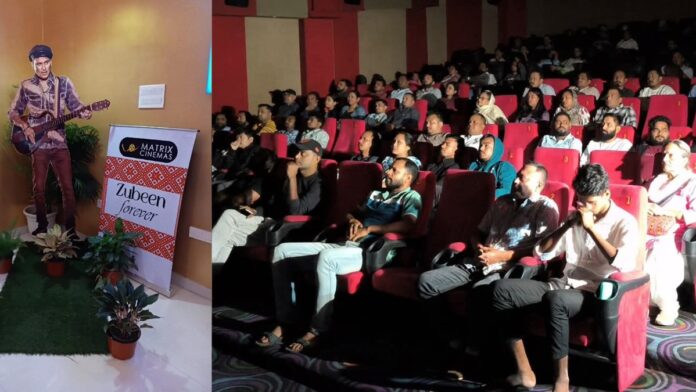Guwahati: Assam woke up to an overwhelming wave of emotion on Friday as Roi Roi Binale, the final cinematic creation of the Zubeen Garg, graced theatre screens across the state. For thousands of fans, this was far more than just a film release — it was a heartfelt goodbye to a legend whose voice and artistry shaped generations of Assamese culture.
The first screening began at 4:25 a.m. at Matrix Cinema Hall in Beltola — an unusual time, yet one that seemed perfectly suited to Zubeen’s unconventional spirit. Even before dawn, crowds of devoted fans gathered outside the theatre, clutching posters and draped in traditional scarves, their faces etched with both anticipation and grief. The atmosphere was heavy with nostalgia and reverence, as though the entire city paused to witness one final act of magic from its most beloved son.
Directed, composed, and envisioned by Zubeen Garg himself, Roi Roi Binale stands as his ultimate gift to Assamese cinema. The film is being celebrated as a mirror of his boundless creativity and his deep, unrelenting love for Assam and its people. Inside the theatres, emotions ran high as every lyric, dialogue, and frame drew thunderous applause — followed by a silence that spoke volumes. Viewers described the experience as “vintage Zubeen” — intense, poetic, and deeply personal.
Many fans left the halls visibly moved. “Zubeen Garg would never have imagined this would be his last movie,” said one tearful viewer. “Through this film, he has expressed everything about his life. He was a messenger of God who reminded us that we are born for a purpose — and he showed that truth beautifully.” Another fan added, “It felt like meeting Zubeen once again today. Every scene carried his soul. I couldn’t stop crying.”
Some, overcome by emotion, walked out midway through the screening. “I couldn’t watch anymore,” one said softly. “Only now will people realise what we have lost. If he were still here, we’d have seen many more masterpieces.”
Across towns like Sivasagar, Moran, Dhemaji, Tihu, Biswanath, Sonari, and Tezpur, theatres paid their own tributes by playing Zubeen’s iconic song Mayabini Ratir Bukut before the film began — a symbolic nod to the artiste who gave Assam its musical heartbeat.
Outside theatres, fans hugged, cried, and prayed. “Zubeen is eternal,” said a young admirer. “It rained again today, just like the day we last saw him at Sarusajai. He is still with us. I wish Garima Saikia Garg strength — she has to stay strong.”
Among those who attended early screenings was former BJP state president Bhabesh Kalita, who watched the film in Rangiya. “Zubeen did a commendable job in his last movie,” he said. “All shows were houseful. The love people have shown proves what he meant to Assam.”
In Guwahati and across districts, most theatres reported sold-out shows from early morning. Many fans travelled from faraway towns to witness what they described as a moment of “history, farewell, and gratitude.”
For Assam, Roi Roi Binale is not just a movie — it is a memory immortalised in light and sound. As the final scene fades and Zubeen’s voice echoes through the halls one last time, silence settles — a silence filled with love, longing, and loss.
And as dawn breaks over Guwahati, one truth remains in every heart: Zubeen Garg may have left the stage, but his music, his passion, and his spirit will echo through Assam forever.

